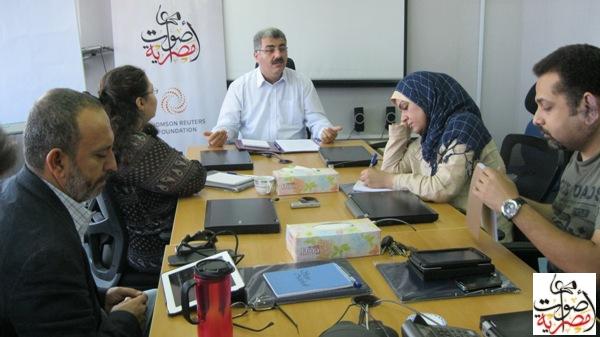Latest NEWS
- Aswat Masriya, the last word
- Roundup of Egypt's press headlines on March 15, 2017
- Roundup of Egypt's press headlines on March 14, 2017
- Former Egyptian President Hosni Mubarak to be released: lawyer
- Roundup of Egypt's press headlines on March 13, 2017
- Egypt's capital set to grow by half a million in 2017
- Egypt's wheat reserves to double with start of harvest -supply min
- Roundup of Egypt's press headlines on March 12, 2017
Blogging: from expression venue to continuous revolution

Conference on blogging and political activism on October 22, 2012 - Soha Nakkash/Aswat Masriya
Prominent Egyptian bloggers said on Sunday that blogging is still significant although it has developed to keep up with the rapidly unfolding events.
In a conference that grouped bloggers Wael Abass, Nawara Negm, Wael Khalil and Lillian Wagdy, Wael Abass said that even television coverage has developed to keep audience updated with the latest news.
Abass added that blogs initially focused on poetry, culture, analyses and philosophy, but eventually people found a need to learn about events in 140 characters and instant image-sharing, referring to Twitter.
Abass insisted that he does not see a difference between freedom of expression before and after the uprising, pointing to the sharp polarization in the media.
Nawara Negm said that the role of blogging is still essential in light of unfolding developments, adding that while she had refrained from blogging for a period, recent events have forced her to return to her blog.
"The current situation raises the need for us to explain our views. I see a second struggle that requires preparation", the political activist and blogger said.
Wael Khalil argued that Twitter changed the understanding of blogging as it provided the people with a new venue where information sharing is very rapid.
He pointed, at Aswat Masriya's headquarters, that Twitter is a comprehensive venue that reflects all sides and faces of a story, reflecting an accurate image of the weight of an issue.
He cited an incident in October of last year where reactions on Twitter stopped a decree from ever reaching the street.
Khalil believes that the advantage of blogging is that it is owned and controlled by the people and may therefore be used however they wish.
He added that social/new media becomes even more influential when traditional media borrows some of the issues circulating on it and offers it to a wider audience.
Lilian Wagdy said that before last year's uprising, she worked in "traditional journalism" before turning to "the people's journalism", referring to blogging, she added that the act indirectly led to her being laid off.
Wagdy believes that "citizen journalists" have the option of whether to be objective but must deliver the truth as that is how mutual trust is developed.
She explained that people have developed awareness and willingness to investigate news and their sources as to act accordingly, in a period often less than five minutes.
Supporting Lilian's argument, Khalil cited four incidents where photoshoped images circulated the web, adding that the investigation process done by the people is part of their learning experience.
Negm said that bloggers turned down an attempt to have them all unite in one platform in 2007, describing the approach as "bleaching a pavement".
Agreeing with Negm, Abass stressed that blogging is an individual activity, not collective, adding however that bloggers could unite efforts for one cause, such as pressure to release a detainee.
Abass explained that his disappointment with traditional media is what initially gave him an incentive to blog. "An opposition newspaper wishing the president a happy birthday for instance and no mention of minorities, such as atheists, homosexuals, etc", Abass said.
He pointed out that as bloggers do not work for a salary, posses little resources and do not abide by editorial policies of institutions, their incentives are very personal.
Negm claimed that while before the uprising bloggers were monitored by State Security, new forces and political factions are now on that as well.
An employee of Egypt's state television (Maspero), Negm, like Abass, insisted that nothing has really changed, but the "revolution continues".
She added that the uprising's only advantage is that it let each revolutionary know that they are not alone, pointing to collective action.
"There is still a regime that plays the same game and opposition trying to expand their freedom venue. Supposedly the revolution began to change all this", Wagdy said.
Abass argued that the ex-regime allowed calculated and monitored breathing rooms that the internet helped the opposition expand, leading to collective awareness and the uprising.
Khalil said that the uprising made known that the internet is not only an expression venue but a tool for action.










